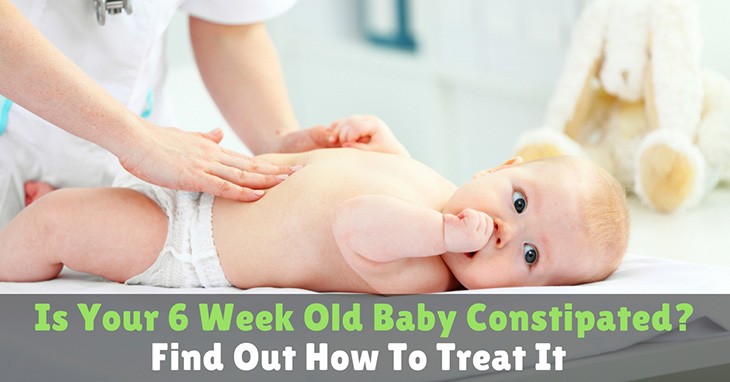Is Your 6 Week Old Baby Constipated? Find Out How To Treat It
Is your 6 week old baby constipated? Has it been a few days since they’ve had a bowel movement? Does it seem like your baby is struggling when having a bowel movement? Or can it be that your baby’s digestion is changing as a part of getting older and now they just poop less often?
It can be hard to tell at this age. When my Little One was constipated it was hard to watch her struggle. I wanted to do everything I could to help her, and I pretty much did.
In this article we’ll talk about signs that your baby might be constipated and some methods that I, along with other moms, have used to treat constipation.
More...
Find Out How To Treat It Here
Frequency Of Bowel Movements
Babies at this age start to decrease in the amount of bowel movements they have. It can vary, but on average a healthy 6 week old baby will only having 1-2 poops per week.
If you’re breastfeeding your baby it’s normal for them not to have a bowel movement every day because all of the nutrients your baby is getting are being used. Meaning there isn’t anything left over to pass through the body. According to WebMD it’s normal for your breastfed baby to only have one bowel movement a week.
However, if you’re formula feeding your baby you might notice they have more than one bowel movement per week. Your baby doesn’t digest all of the nutrients of formula as they would breast milk. Therefore, there is more to pass through the body equaling more bowel movements.
Signs Of Constipation
If you notice that it’s been at least 7-10 days and your baby hasn’t had a bowel movement, especially if they are formula fed, then there is a chance they could be constipated. If you do suspect your baby is constipated I recommend speaking to your pediatrician.
Here are some other signs that your baby might be constipated:
- If your baby is straining (more than normal) when trying to have a bowel movement.
- If your baby cries or is overly fussy when trying to have a bowel movement.
- The pressure of the backed up bowel could make your baby’s belly look bloated or full and feel hard or stiff to the touch.
- Your baby might have a loss of appetite or get full faster due to the discomfort.
- If your baby does have a bowel movement it’ll be hard and dry.
- If your baby’s stool has bloody streaks it could be a sign that your baby is straining too hard.
How To Treat Constipation
If you notice your baby is showing signs of constipation you’ll want to visit your pediatrician. There are multiple ways you can treat constipation, but always follow doctor’s order.
Here are some ways your pediatrician might recommend treating your baby’s constipation:
- Your baby could have a milk-protein allergy. Which means if you’re feeding your baby a milk-based formula this could be causing constipation. In that case you’ll want to change the formula.
- If you are breastfeeding your baby you might change some of the foods in your diet.Especially if your baby has a milk-protein allergy you'll want to stay away from milk-based products.
- Formula in general can be a bit harder to digest which can cause some constipation so changing to a different brand (even if your baby doesn’t have a milk-protein allergy) can help ease your baby back into normal bowel movements.
- You can do little exercises with your baby to help move the bowel through their systems. For example, while laying your baby on their back you can move their legs in a bicycle motion. Another exercise that works well is to gently straighten their legs (while laying on their back) and then pushing the knees back towards their belly. Repeat for about 5 minutes.
- A warm bath could help relax your baby and their muscles so that passing the stool isn't as hard.
- Give your baby a little bit of apple juice, pear juice or prune juice. The sugar isn’t digested so it’ll help draw fluids into the intestines which will help move the bowel out of the system.
- Help by stimulating the bowels by giving your baby a belly massage by gently rubbing their belly in a circular motion.You can even do this after giving them a warm bath.
If these options don’t work your pediatrician might recommend a few other remedies which involve laxatives and/or stimulation. Always speak to your pediatrician before using any of the following products.
- Wellements Baby Move is an organic non-harsh laxative to help with occasional baby constipation. It contains organic prunes and prebiotics which is safe for infants.
- Pedia-Lax is a glycerin suppository, which is recommended over using enemas or mineral oil by the Mayo Clinic.
- Rectal stimulation with the tip of a thermometer or Q-tip can help stimulate the movement of stool to pass.
Conclusion
Healthy babies aren’t consistent when it comes to bowel movements so it’s hard to tell if your baby is becoming constipated. That’s why looking to see if there are other signs of constipation is helpful before going to see the pediatrician.
The remedies I listed above helped my Little One get through her constipation and I hope it helps yours. I never thought I’d be so happy to clean a dirty diaper! Because that meant she was back on track with her bowel movements and she was back to being a comfortable and happy baby.
Did you find this article helpful or do you have more questions? Let me know in the comments below.


